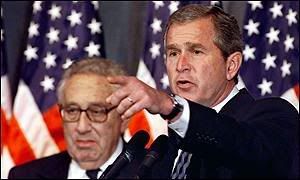|
Those weren't dominoes. They were people. Pol Pot And Kissinger
On war criminality and impunityBy Edward S. Herman The hunt is on once again for war criminals, with ongoing trials of accused Serbs in The Hague, NATO raids seizing and killing other accused Serbs, and much discussion and enthusiasm in the media for bringing Pol Pot to trial, which the editors of the New York Times assure us would be "an extraordinary triumph for law and civilization" (June 24). The Politics of War CriminalityThere are, however, large numbers of mass murderers floating around the world. How are the choices made on who will be pursued and who will be granted impunity? The answer can be found by following the lines of dominant interest and power and watching how the mainstream politicians, media, and intellectuals reflect these demands. Media attention and indignation "follows the flag," and the flag follows the money (i.e., the demands of the corporate community), with some eccentricity based on domestic political calculations. This sometimes yields droll twists and turns, as in the case of Saddam Hussein, consistently supported through the 1980s in his war with Iran and chemical warfare attacks on Iraqi Kurds, until his invasion of Kuwait in 1990, transformed him overnight into "another Hitler." Similarly, Pol Pot, "worse than Hitler" until his ouster by Vietnam in 1979, then quietly supported for over a decade by the United States and its western allies (along with China) as an aid in "bleeding Vietnam," but now no longer serviceable to western policy and once again a suitable target for a war crimes trial. Another way of looking at our targeting of war criminals is by analogy to domestic policy choices on budget cuts and incarceration, where the pattern is to attack the relatively weak and ignore and protect those with political and economic muscle. Pol Pot is now isolated and politically expendable, so an obvious choice for villainization. By contrast, Indonesian leader Suharto, the butcher of perhaps a million people (mainly landless peasants) in 1965-66, and the invader, occupier, and mass murderer of East Timor from 1975 to today, is courted and protected by the Great Powers, and was referred to by an official of the Clinton administration in 1996 as "our kind of guy." Pinochet, the torturer and killer of many thousands, is treated kindly in the United States as the Godfather of the wonderful new neoliberal Chile. President Ford and Secretary of State Kissinger, who gave the go ahead to Suhartos invasion of East Timor and subsequent massive war crimes there, and the same Kissinger, who helped President Nixon engineer and then protect the Pinochet coup and regime of torture and murder and directed the first phase of the holocaust in Cambodia (1969-75), remain honored citizens. The media have never suggested that these men should be brought to trial in the interest of justice, law, and "civilization." U.S./Western Embrace of Pol PotThe Times editorial of June 24 recognizes a small problem in pursuing Pol Pot, arising from the fact that after he was forced out of Cambodia by Vietnam, "From 1979 to 1991, Washington indirectly backed the Khmer Rouge, then a component of the guerrilla coalition fighting the Vietnamese installed Government ." This does seem awkward: the United States and its allies giving economic, military, and political support to Pol Pot, and voting for over a decade to have his government retain Cambodias UN seat, but now urging his trial for war crimes. The Times misstates and understates the case: the United States gave direct as well as indirect aid to Pol Potin one estimate, $85 million in direct supportand it "pressured UN agencies to supply the Khmer Rouge," which "rapidly improved" the health and capability of Pol Pots forces after 1979 (Ben Kiernan, "Cambodias Missed Chance," Indochina Newsletter, Nov.-Dec. 1991). U.S. ally China was a very large arms supplier to Pol Pot, with no penalty from the U.S. and in fact U.S. connivanceCarters National Security adviser Zbigniew Brzezinski stated that in 1979 "I encouraged the Chinese to support Pol Pot...Pol Pot was an abomination. We could never support him but China could."
In 1988-89 Vietnam withdrew its army from Cambodia, hoping that this would produce a normalization of relationships. Thailand and other nations in the region were interested in a settlement, but none took place for several more years "because of Chinese and U.S. rejection of any...move to exclude the Khmer Rouge. The great powers...continued to offer the Khmer Rouge a veto," which the Khmer Rouge used, with Chinese aid, "to paralyze the peace process and...advance their war aims." The Bush administration threatened to punish Thailand for "its defection from the aggressive U.S.-Chinese position," and George Shultz and then James Baker fought strenously to sabotage any concessions to Vietnam, the most important of which was exclusion of Pol Pot from political negotiations and a place in any interim government of Cambodia. The persistent work of the Reagan-Bush team on behalf of Pol Pot has been very much downplayed, if not entirely suppressed, in the mainstream media.
The Times has a solution to the awkwardness of the post-1978 Western support of Pol Pot: "All Security Council members...might spare themselves embarrassment by restricting the scope of prosecution to those crimes committed inside Cambodia during the four horrific years of Khmer Rouge rule." We must give the Times credit for semi-honesty in admitting that this is to avoid embarrassing the Great Powers. It is interesting, though, that the Times finds no real problem in the "dirty hands," and hypocrisy, so apparent in the lengthy support of war criminals, and that it offers no reflections on how "law and civilization" are served if the criminals were protected and supported for more than a decade by the forces of law and order.
CONTINUED...
http://www.zmag.org/zmag/articles/hermansept97.htm
Four or five million people.  "Money trumps peace." -- George W Bush, Feb. 14, 2007. |